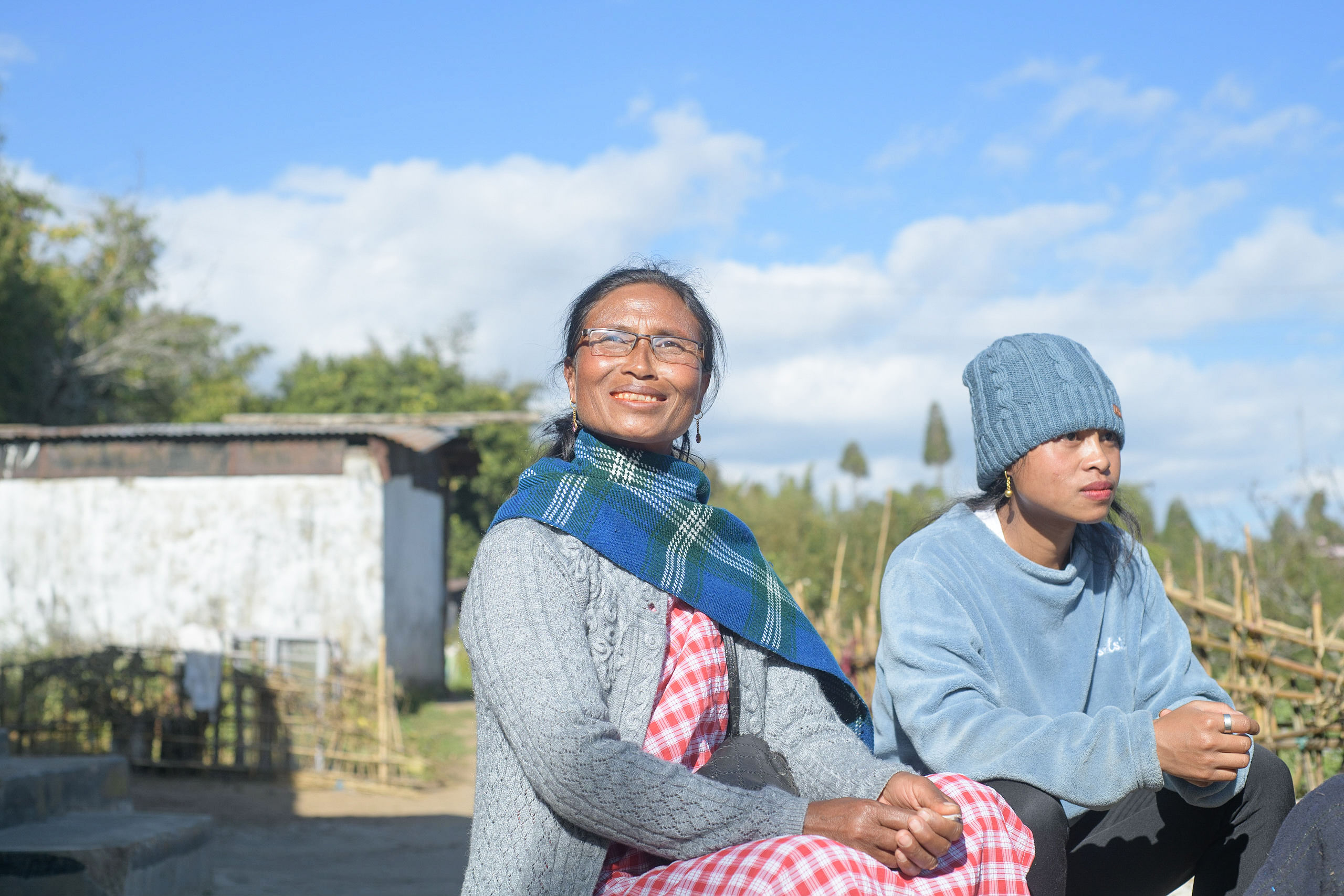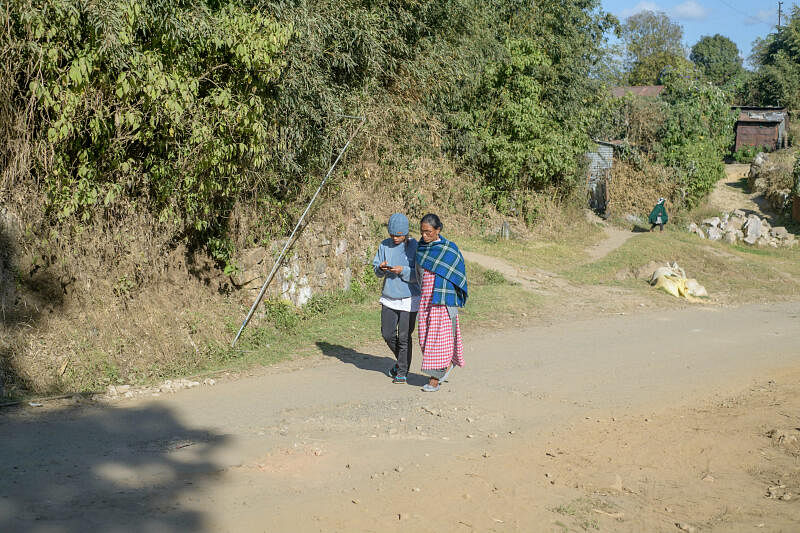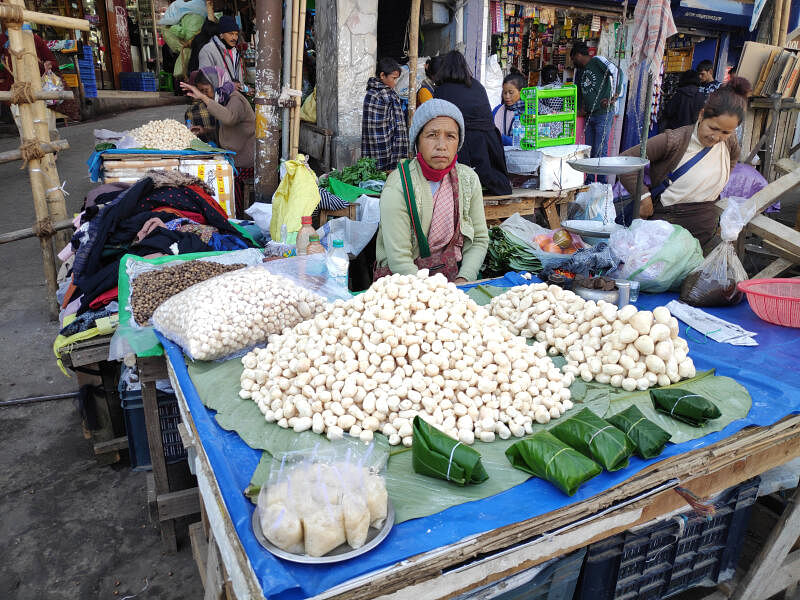How one woman grabbed a rare chance for change in India's Khasi matrilineal tribe
Teacher Fatima Mynsong tells of how she spoke up against corruption and pushed for change in India's Khasi tribe. This is the second of a four-part daily series in which The Straits Times documents women from across Asia and the challenges they face and overcome. It caps the Year of Celebrating SG Women and recognises that advancing women's interests in society remains an ongoing endeavour.
Sign up now: Get insights on Asia's fast-moving developments

School teacher Fatima Mynsong dreams of a future when her daughter (right) will be part of village councils where women are now prohibited.
PHOTO: PRAKASH BHUYAN
Follow topic:
JONGKSHA, MEGHALAYA - School teacher Fatima Mynsong has always lived in a woman's world.
As a woman and mother in one of the world's few matrilineal societies, she makes all the decisions and has the final say in her household.
But it was only in the last decade that she learnt how to make men in her wider community take her views seriously as well. And that is no mean feat for someone in an Indian tribal community so rooted in its revered customs and traditions.
In Ms Mynsong's Khasi tribe in the north-eastern state of Meghalaya, it is the women who run the household, own family property and pass their clan names to their children - unlike the patriarchal customs in most parts of India.
"My sons and daughter take my clan name as I'm their mother," the 50-year-old mathematics teacher, who has two sons and a daughter, tells The Straits Times.
"Our ancestors determined that the youngest daughter must look after her family. She takes on the lineage, resides in the household, and looks after the parents. She is also the one who will inherit her parents' property," says Ms Mynsong, who lives in Jongksha village in East Khasi Hills.
In her tribe, it is the husband who moves into his wife's household.
"Within our household, we, the women, have the power. We have the last word with our husband, our sons and our daughters," she says.
Her family is among the 1.41 million Khasis who practise matriliny, their societal norm for more than 2,000 years. Similar customs are also observed by the Garo and Jaintia tribes in Meghalaya.
Empowered, yet trapped
Matriliny creates a world where a majority of men cook, having learnt to do so when their mothers and sisters worked on the farm. All boys and girls go to school, and most Khasis have a greater attachment to their mother's home than the household they marry into.
In Iewduh wholesale market in the state capital of Shillong, women line the crowded streets, selling yams, chillies, fish, chicken, betel leaves and cane handicraft, as they order their male employees to move big sacks of produce around the market. Women also own and manage most of the rice-and-meat eateries there.
Yet, Khasi customs exclude women from community affairs. For example, they cannot participate in the tribal village council or dorbar, led entirely by men under the male clan chieftain or king.

"It is strange that outside the household, Khasi women have no power at all. We're not allowed to even attend the village council. We don't have the opportunity to speak our truths outside. This bewilders and confuses us women," says Ms Mynsong.
While women control the household, they can also feel imprisoned within it, she said.
Without much exposure, many of them are nervous in new social settings, according to Ms Mynsong.
"When we have to go to the doctor, we are usually afraid. If we have to meet officials, we can get as frightened as we are of tigers...
Khasi women often end up hiding in a corner," she tells ST.
Women's exclusion from the village council has created a practice where they coach the men in their household on what to say at the council meetings.
"That isn't real representation," says Ms Mynsong.

Across the world, women's political representation has doubled in the last 25 years, but they are still significantly underrepresented in the highest political positions, based on a 2020 report by UN Women.
Many countries try to improve gender parity by mandating women's representation - India reserves 50 per cent of seats in village governments for women - but many hesitate to participate due to family responsibilities, political inexperience and social pressures.
Ms Mynsong notes that it was often the women who first discovered water shortages, farming concerns or brewing unrest in the village.
"So how is it that only men are allowed to speak up? How can men be the only ones to make laws in our community?" she asks.
Even if the women are educated, "they are still often left behind".
A turning point

Brought up with a courageous spirit, strong self-esteem and feminine pride, Ms Mynsong had always felt discomfited by the Khasi customs that kept women out of community matters. But she had never questioned it publicly.
In 2008, however, she found the chance to break her silence.
As villagers struggled for income, the Jongksha tribal council decided to implement the Indian government's rural employment scheme. It assured minimum wages for 100 days' work of building roads, footpaths or water tanks.
Villagers had to form a committee to oversee the work and ensure transparency. The law mandated that half the committee be composed of women, often the majority of those seeking work.
When Jongksha village decided to construct a footpath, Ms Mynsong was appointed as a committee member.
As part of her duties, she recorded worker attendance and paid wages at the work site.
Within months, she noticed that something was amiss.
"The chairman (of the village council), the secretary and the members were stealing people's wages," she says.
She noted that wages were being transferred to people she had never seen at the work site, attendance was falsified and full wages were not paid to the actual workers.
"I told myself that I had to seek out the truth... For the sake of those who had to go hungry, for the welfare of many, I had to do something."
With one other woman committee member, she raised the issue at the village council meeting in late 2008. It was the first time that she had attended such a meeting.
Speaking up in that solemn setting was scary - but also exhilarating, she recalled.
She thought of the equal rights that women have under the Indian Constitution and how it had empowered some women to break through a patriarchal society to become legislators and parliamentarians.
"Thinking of them made me courageous," she says.
Courage becomes habit

When the council ignored their complaints, she approached higher officials in the East Khasi Hills district administration with two other women in the village.
"We went to different kinds of offices, but no one paid us any attention, no one listened. It was like they looked down on us women," Ms Mynsong says.
Frustrated, she filed a Right to Information application demanding to see the roster used to calculate wages and work days.
Afraid that their ghost workers and inflated figures would be exposed, the village leaders blocked the information using their political connections.
They also ordered that the women be refused subsidised rations and be ostracised.
But the women endured the boycott with quiet support from friends, and battled on for six years.
Official penalties never came for the village leaders, but the locals became more vigilant about corruption, making it harder for the leaders to siphon off funds. Subsequent leaders, though still male, were forced to be more transparent.
Ms Mynsong recalls that in those years, every time she stepped out of her house, she gave herself a pep talk: Be brave, for the sake of your village, and the daughters who will come after you.
"It took years for a result. But in the end, women's leadership bore fruit. Those who continued the work (in the council) are not as corrupt today," she tells ST.
Even as the Khasi councils today propose equal inheritance rights for boys and girls, Ms Mynsong suggests another reform few are speaking of: "Gradually, I want our customs and traditions to let women participate in the village council too, to become leaders of the community."

